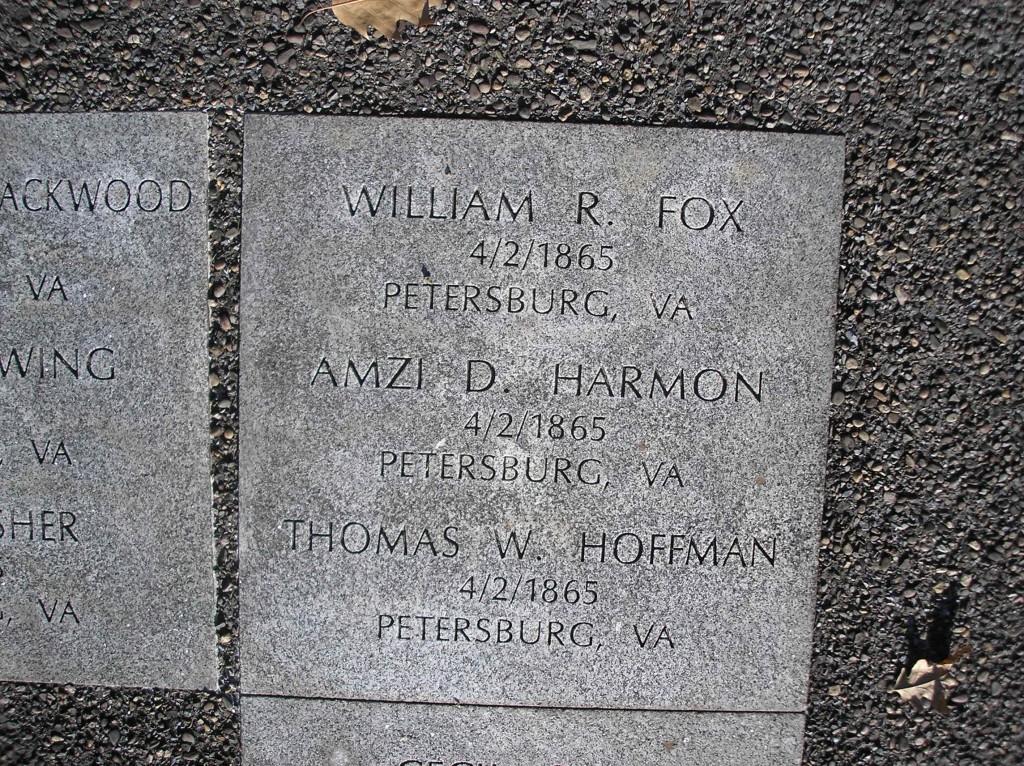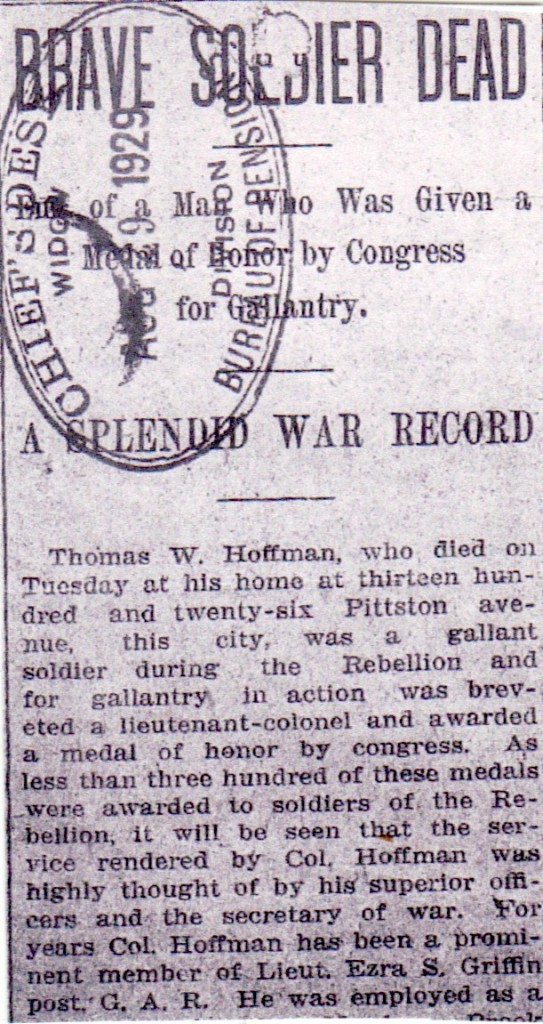Obituary of Thomas W. Hoffman – Medal of Honor Recipient
Posted By Norman Gasbarro on August 11, 2014
Thomas William Hoffman was born in Berrysburg, Dauphin County, on 21 July 1839, the son of Amos A. Hoffman (1809-1897) and Amanda [Harper] Hoffman (1815-1897). Through the paternal line, he was a direct descendant of Johann Peter Hoffman (1709-1797) and his son, John Nicholas Hoffman (1749-1814), pioneer settlers of the Lykens Valley. Thomas served two enlistments in the Union Army. He was first enrolled in the 72nd Pennsylvania Infantry, Company E, as a Private, serving from 10 August 1861. The military records indicate that on 1 October 1863 he was transferred from that service to the Veteran Reserve Corps. However, on 9 July 1864, he helped form the 208th Pennsylvania Infantry, Company A, where as Captain, he began his service on 7 September 1864. As a result of his heroic actions in front of Petersburg, he was awarded the Medal of Honor. Thomas W. Hoffman died on 18 April 1905 at Scranton, Lackawanna Co., Pennsylvania, where he was living at a boarding house with his second wife, Dr. Helen Delucia [Fisk] Hoffman of New York. The obituary for him which appeared in a local Scranton-area newspaper was presented to the Pension Bureau on 9 August 1929 (see date stamp on portion of above clipping) as part of the application of his widow for survivor’s benefits for which she first made application on 3 March 1913. The obituary is presented in this blog post. It is an unusual obituary in that it mostly consists of an interview conducted with Hoffman just weeks before his death in which he recounted his experiences in the war and told of the deed that resulted in his award. It also does not mention survivors. The widow’s pension application and the complexities raised in it will be presented at a later date.
BRAVE SOLDIER DEAD
End of a Man Who Was Given a Medal of Honor by Congress for Gallantry
Thomas W. Hoffman, who died on Tuesday at his home at thirteen hundred and twenty-six Pittston Avenue, this city, was a gallant soldier during the Rebellion and for gallantry in action was breveted a lieutenant-colonel and awarded a medal of honor by congress. As less than 300 of these medals were awarded to soldiers of the rebellion, it will be seen that the service rendered by Col. Hoffman was highly though of by his superior officers and the secretary of war. For years Col. Hoffman has been a prominent member of Lieut. Ezra S. Griffin Post G.A.R. He was employed as a bookkeeper by the Meadow Brook Coal Company.
The brave deed for which Col. Hoffman was breveted was done in March 1865, at the capture of Lee’s works near Fort Hill in front of Petersburg. Talking to a reporter some months before his death, Col. Hoffman told the story of the gallantry that won his promotion in the following words.
“During the week that we were stationed at Steadman our division was ordered to capture Lee’s works. I was detailed on General Hartranft’s staff as engineer officer of the division.
“The troops were ordered out in the middle of the night and deployed inside our picket lines. When daylight began to show on the eastern horizon a signal gun was fired. This was the signal for the attack and our troops advanced to the fray. They rushed across the space between the two lines, tore down the obstructions, jumped into the moat from whence they scaled the… of the fort capturing four forts with twenty-five guns in a space of five minutes.
“The rebels made a great effort to retake the forts, making numerous charges, but we succeeded in holding them back during the entire day. Sometime during the afternoon I was sent out by General Hartranft to the commanding officer of the second brigade to ascertain if it were possible for him to hold the forts captured.
“Just as I came to the forts it happened that my own regiment, the Two Hundred and Eighth [208th Pennsylvania Infantry] was deployed at this place. When I was but a short distance away I heard the lieutenant-colonel of my regiment call to the men to retreat, and that they were being surrounded. Presently he and the major of the regiment started on the run for the rear, expecting the regiment to follow. I took the situation at a glance and drawing my sword called to the men at the top of my voice, ‘Don’t a man of you run; they can’t drive you out of here.’
“When the line officers discovered that there was some one to take charge of the regiment they immediately rallied the men and kept them in position. After awhile the lieutenant colonel and major came back with a rather sheepish look. I said nothing to them concerning their actions. The facts of the above incident were afterwards reported to Secretary of War Stanton and after due consideration congress awarded me a medal of honor.
Colonel Hoffman was born at Berrysburg, Dauphin County, Pennsylvania, on 31 July 1839 and was accordingly sixty-five years of age. He enlisted in Company E, 72nd Regiment Pennsylvania Volunteers Fire Zouaves [72nd Pennsylvania Infantry]. Each company in the regiment represented some fire company in Philadelphia. This regiment was hurried into Virginia and Colonel Hoffman, while relating his experiences, says that the second day after his arrival there he saw a captain of the California Regiment killed on the picket line.
He took part in the Battle at Ball’s Bluff and in the following Sprint he was among those who advanced with Banks and went as far as Winchester from whence they were recalled and sent to Yorktown. A little later he took part in the Battle at Fair Oaks and later in the great Seven Days Fight. His regiment opened the Battle of Savage Station and suffered heavy losses; it was also at the Peach Orchard and later at Malvern Hill.
At Antietam, Colonel Hoffman’s regiment was heavily engaged and suffered severely. It also fought at Fredericksburg and later at Chancellorsville. In August 1864 his regiment was mustered out. He returned home and recruited a regiment which became the Two Hundred and Eighth Pennsylvania [208th Pennsylvania Infantry]. This regiment served in General Butler’s army and later was sent to the command f General Hartranft’s division. While with him occurred the Battle of Fort Steadman and later the feat of gallantry that won him his medal of honor.
When the Jonas Long’s Sons Department Store first opened in this city, Colonel Hoffman had charge of the grocery department.
Funeral services were held over the remains at the home yesterday at which Rev. Mr. Peck of Elm Park Church officiated. The remains are to to be taken on the 9:45 Delaware and Hudson train to Sunbury for interment which will occur on Friday. D. D. Jones and Son are in charge of the funeral arrangements.
A memorial in Harrisburg features in-ground markers recognizing the Pennsylvanians who were awarded the Medal of Honor. In a prior post, that memorial was featured along with the stone for Thomas W. Hoffman which includes the date, 2 April 1865 of his action at Petersburg:

—————————-
Note: The Medal of Honor is awarded by the president on behalf of Congress to a person who distinguishes himself by gallantry at the risk of his or her own life above or beyond the call of duty while engaged in a military operation. The individual who is awarded the medal must have performed an act that is clearly above any act performed by his or her comrades. The medal signifies extraordinary merit and there is no higher military honor than can be given. Also, the total number of Civil War medals awarded was not around 300 as stated in the obituary; however, that number is correct if only the number of Pennsylvania recipients are counted. See: Pennsylvania Medal of Honor Memorial.
 ;
;



Comments